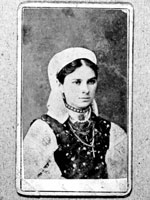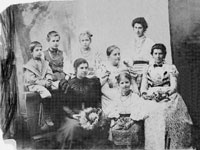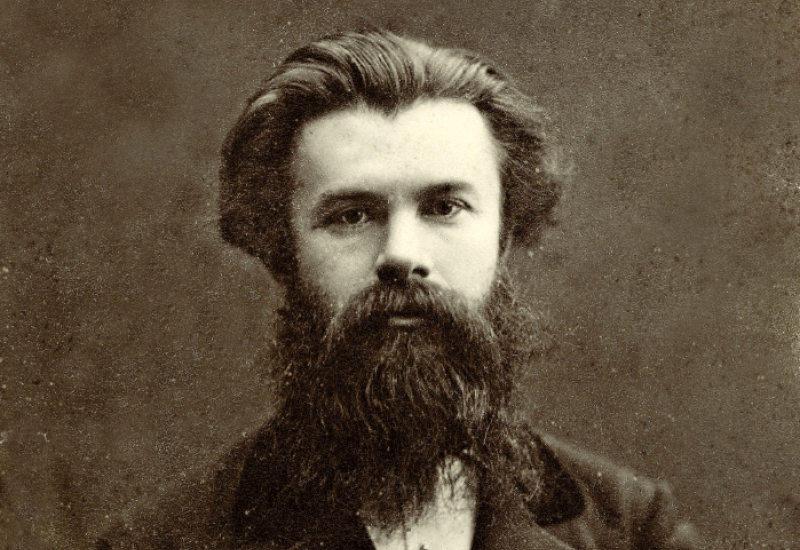Social and political activity of M.P. Drahomanov was in progress in the years 1960-1990. In the history of Russia, Ukraine and the Western Europe, it was an extremely difficult period of time which had a determinative tendency of amplification of the working liberation movement. M.P. Drahomanow was not only a bystander but also a grand figure of the social processes in Ukraine in 1859-1861. That was why it was just his fate to play the most percetible role in the social and spiritual development of the Ukrainian people at that period of time when the titanic revolutionary activities of one of the Ukrainian geniuses - Taras Schevchenko - had come to the end, and of the other one - Ivan Franko - had just begun. The absolute fact is that in the history of the advanced social and political view in Ukraine after the death of T.G. Schevchenko and until the emergence of policy articles on sociology issues, history and literary criticism by I.Franko at the end of 1970s, the dominant place undoubtedly belongs to Mykhailo Drahomanov.
His works and political activity always attracted the greatest attention of scientists. Unfortunately, that eccentric thinker was often unconditionally listed as the nationalist or the bourgeois liberal. Scientific and objective assessment of everything Drahomanov had made for the liberation movement and advanced culture, the concrete historical analysis of difficult conditions of his life and work were often replaced by abstract schemes, one-side, subjective determinations.
There were many reasons for this, however it was not the subject of this article. New generations can not and should not be indifferent to their great predecessors, those devotees of the mind, who were paving the way into our day upon incredibly difficult conditions.
Mykhailo Petrovych Drahomanov was born in Poltava region, Gadyach, in a family of small gentry. His father, Petro Yakymovych, had a university education, studied ethnography and appeared in Russian journals of literary works and had radical progressive views. His sister Olga (per name Olena Pchilka) was a widely known writer and a cultural and community activist, and mother of the famous Lesia Ukrainka. In 1863 M. Drahomanov graduated the Historical and Philological Faculty of Kyiv St. Vladimir University, was kept at the Department of General History and was preparing to become a professor. With this purpose he often went on scientific mission to enrich the knowledge in universities of the Western Europe.
At the department of Kyiv University he wrote his first studies on the history of the Roman Empire. In 1870 he defended his Master's thesis "The question of the historical significance of the Roman Empire and Tacitus". Generally, the young scientist was deeply aware of the urgent need of the basic training for a new stage of scientific studies development in the field of folklore, Ukrainian literature, social and political publicism. Already at the end of 1860 he had material for formation of folklore works. By that time, he spoke several languages and had read a lot of fiction, scientific literature, including the works of foreign scholars O.Konta, H.Spencer, P.Prudona, I.Tena, T.Benfeya. I.Franko got acquainted with Drahomanov in 1875 and later he highly noted a direct influence of Drahomanov on the formation of a large cohort of progressive young people in Galicia. "An extremely critical intellect, a professional historian with a broad European education, he wrote a study on ethnographic material in the strict historical method, and also he was sharply against the amateurism and mythological, a priori improvising, demanding a comparison of the studios and a detailed distinguishing in ethnographic materials of that that is international and borrowed, as well as of that created basing on the personal experience", – wrote I.Franko in 1990.
 Even at his student years M. Drahomanov was in the midst of social and political events. He boldly defended progressive pedagogical reforms of the trustee of N. Pirogov Kyiv educational district, condemning the government sanctions against the scientist. Political attitudes of M. Dragomanov, their national and political orientation during the reburial of Taras Shevchenko were more clearly undecided, and he said at the grave of Kobzar: everyone who got down to the service of the enslaved people consciously put a crown of thorns. It became also a kind of a slogan and a meaningful life choice for M. Dragomanov. Political radicalism and national Ukrainian involvement were strengthening during his practical work and the growth of government repression against the most innocent forms of national consciousness display.
Even at his student years M. Drahomanov was in the midst of social and political events. He boldly defended progressive pedagogical reforms of the trustee of N. Pirogov Kyiv educational district, condemning the government sanctions against the scientist. Political attitudes of M. Dragomanov, their national and political orientation during the reburial of Taras Shevchenko were more clearly undecided, and he said at the grave of Kobzar: everyone who got down to the service of the enslaved people consciously put a crown of thorns. It became also a kind of a slogan and a meaningful life choice for M. Dragomanov. Political radicalism and national Ukrainian involvement were strengthening during his practical work and the growth of government repression against the most innocent forms of national consciousness display.
M. Drahomanov expanded the field and made the forms of activity to be different, considering an active participation in all the activities "of Kyiv Community" formed in 1873" the Southwestern Branch of the Russian Geographical Society" and
conducted in 1873 the Third Archaeological Congress in Kyiv. In a year, M. Drahomanov headed and reformed in a democratic spirit a newspaper "Kyivskyi Telegraph", and attracted his adherents and friends to take part in it, they were V.Antonovych, P.Chubynsky, F.Vovk, S. Podolynsky, O.Terletskyi and others.
An ardent patriot and a deep connoisseur of a native and world culture, M. Drahomanov characterized folk and the written Ukrainian literature as not inferior to other Slavic literatures. Hoping to get sympathy of progressive forces in Europe, he also stated: " the Ukrainians just need to go their own way and work, work and work for their people, relying only on their own strength, without paying too much attention to outside ravens and those who croak with ridiculous circulars, nor to those who are thinking to divert them from the natural and strictly deliberate road with the help of sham nightingale songs". Reasonably polemicizing with hypocritical "enthusiasts" and dethroning the fictions and verdicts of enemies and ignoramuses, M. Drahomanov proudly declared: " There is and there will be the literature that is its right: it is called and maintained by natural needs, so as not to deny its right to exist, it still will exist and grow up... The important thing is only that it need to be alive, popular and should serve the intellectual development of those who speak or will speak the language of the people". He realized himself and relentlessly reminded his countrymen: "… if at the current dark night the Ukrainians by themselves do not declare loudly and clearly, no one would follow him when the morning came". And it certainly did come, M. Drahomanov was sure of it. "All the practical human wisdom, - he stressed, - may be in the way of perceiving the global world direction, its measure, the law and be promoted by this movement, he underlined", and figuratively refined:"… standing feet and hearts in our Ukraine, we will keep our heads in Europe, and embrace merely the whole Slavdom" and " only when we will show our power at least at a part of our land, Europe will certainly pay its attention for us".
 M. Drahomanov was strongly against the system of terror which restricted the political struggle with personalities but not with the certain current regime, and he predicted that those orders could easily become a kind of state terrorism. As a political leader, he had a lot of enemies and plenty of admirers. He had a sharp word and was merciless to unconsidered and unjustified actions. There was no doubt that he had a critical and creative mind, combined with courage of a thinker and a politician, courage that allowed him to pave his own ways.
M. Drahomanov was strongly against the system of terror which restricted the political struggle with personalities but not with the certain current regime, and he predicted that those orders could easily become a kind of state terrorism. As a political leader, he had a lot of enemies and plenty of admirers. He had a sharp word and was merciless to unconsidered and unjustified actions. There was no doubt that he had a critical and creative mind, combined with courage of a thinker and a politician, courage that allowed him to pave his own ways.
He gave not only all his intellectual forces and health but also all his and his family’s material resources for the national, political and social liberation of the people of Ukraine, consolidation of its worthy place among the nations, preparation of its great future, setting an example of a personal sacrifice and household modesty for a lot of people.
When a group of the Ukrainian youth appealed to their teacher and protector with a request to trouble over Ukraine again in the free world, he gave an advice which should be fixed in our minds even today: "It is naive to expect that people in general, even the most humane ones, are worried about the others merely because they are being hit... Are there too few people who are beaten around the globe?! People usually are interested only in those ones who can hit back, and so they help such individuals... Consequently, it means that slow and hard counting for the Ukrainian disasters is in the hands of the Ukrainian people…"
Can anyone give wiser and more useful pieces of advice? But they were also supplemented by M. Drahomanov as well as elaborated by many others variants: how should we behave in an independent state, how to keep our people safe, especially young people, from "fugitive… from Ukraine and the Ukrainians" to wealthier countries, "showing them how you can serve the global interests in the field of the Ukrainians".
At the same time, he urged the owners not to be afraid "to hit back anyone who wanted to govern in our land not only to our people’s detriment, but doing that without knowing, without asking them for it or even despising them ... And someone strange who is working in alliance with our people respecting them, that one who sticks to our communities... that one is the same man for us, as if he was our naturally".
The voice of M. Drahomanov has not subsided over Ukraine and all over the world. Let us always listen to it!
Photos:
- Mykhailo Drahomanov
- The wife Liudmyla Drahomanova
- Dragomanov and Kosach families in the 1980s. On the left are the children of Mykhailo Drahomanov: son Svitosar and the oldest daughter Lidia (wearing a black dress). In the centre are: Olexandra Dragomanova, the brother’s wife with a daughter Oxana. On the right side is Olena Pchilka, Olga Dragomanova in her girlhood and Kosach in marriage. From left to right stand her daughters Oxana and Izydora Kosach, the sisters of Lesia Ukrainka, and their cousin Adriana (behind Olena Pchilka), the youngest daughter of Mykhailo Drahomanov

